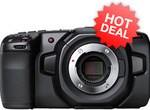In stock
Blackmagic Design Pocket Cinema Camera 6K (Canon EF) CINECAMPOCHDEF6K also available for $2750 https://www.videopro.com.au/p-12714-blackmagic-design-pocket…
Also, these cameras can shoot straight to a small SSD.
The 1TB SSD recommended for use with these cameras is here and currently on sale
https://www.ozbargain.com.au/node/594686
The Blackmagic Design Pocket Cinema Camera 4K features a 4/3" sensor for capturing up to 4096 x 2160 DCI 4K images at rates up to 60 fps in a variety of codecs including CinemaDNG Raw/Raw 3:1/Raw 4:1, and various ProRes 422 options. Slow-motion rates up to 120 fps are available in cropped Full HD. Its Micro Four Thirds lens mount accommodates the original, lightweight Pocket Cinema Camera lenses, and can be used with PL, C, EF, and other lenses with the use of separately available adapters. A dual-native ISO up to 25,600 is featured for low-light capture, and 13 stops of dynamic range provide rich HDR images.
Record using the internal CFast 2.0 and SD/UHS-II card slots, or employ the USB-C output for capturing longer clips to an external drive. The Pocket Cinema Camera 4K's 5" touchscreen LCD display reduces the need for an external, onboard monitor, while a full-sized HDMI port enables you to output a signal to a larger display. The menu and interface are the same as the ones found on the URSA Mini camera, and 3D LUTs can be applied for monitoring or for baking in your look when you're ready to commit.
Audio features include a mini-XLR input with phantom power for pro-style mics, a 3.5mm jack, and an internal stereo mic. Additional features include the same Blackmagic OS as the URSA Mini, and Bluetooth remote control. A license key for DaVinci Resolve Studio is included for versatile post-production control. The Pocket Cinema Camera 4K's carbon fiber polycarbonate build provides lightweight strength and durability, and power options include running off a Canon LP-E6 type battery or the included power supply.
4/3" Image Sensor / Dual Native ISO The Pocket Cinema Camera 4K uses a 4/3" sensor, 13 stops of dynamic range, and a dual native ISO up to 25,600 to capture rich images at resolutions up to DCI 4K.
Active Micro Four Thirds Lens Mount Use lightweight, electronically-controlled MFT lenses, or use separately available adapters to expand your lens choices to include PL, C, or EF-mount lenses.
CinemaDNG Raw and ProRes Options Choose from CinemaDNG Raw and ProRes 422 files options depending on your project's needs.
5" Touchscreen Display A large 5" touchscreen display reduces the need for an external on-board monitor, while a full-sized HDMI port enables you to output a signal to a larger display on your video village.
CFast 2.0, SD/UHS-II, and USB Type-C Capture Internally record to CFast 2.0 or SD/UHS-II card slots, or capture longer clips using the USB-C output to an external drive.
Flexible Power Options The Pocket Cinema Camera 4K can be powered using a rechargeable Canon LP-E6 type battery or the included power supply.
DaVinci Resolve Studio An activation key for DaVinci Resolve Studio is included with the camera.
Product Features
4/3" Sized HDR Sensor
Record DCI 4K 4096 x 2160 up to 60 fps
lDual Native ISO to 25,600
In The Box
Blackmagic Design Pocket Cinema Camera 4K
DaVinci Resolve Studio Activation Key
30W Power Supply with International Adapters
Dust Cap
Limited 1-Year Warranty





Amazing cameras.